
ASP in Dallas: Climate Change and America’s National Security
Podcast: Play in new window | Download
Subscribe: Apple Podcasts | RSS
On Monday and Tuesday, June 2 and 3, representatives of the American Security Project visited Dallas, Texas for a series of meetings, public events, and briefings on how climate change is affecting security, and how institutions in the region are planning for it.
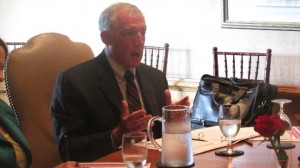
Attending were BGen Stephen Cheney, USMC (ret.), ASP’s CEO and Maj. General Paul Eaton, USA (Retired). Cheney is the CEO of the American Security Project, and a 30 year veteran of the Marine Corps. Eaton currently serves as Senior Advisor to the National Security Network. His most recent operational assignment was Commanding General of the command charged with reestablishing Iraqi Security Forces 2003-2004. Both are members of ASP’s Consensus for American Security. Andrew Holland, ASP’s Senior Fellow for Energy and Climate, and Porter Brockway, ASP’s events manager, rounded out the delegation.
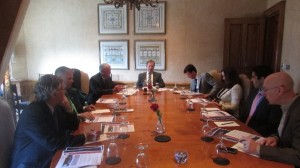 The first appointment was an event cosponsored with the Dallas Committee on Foreign Relations. Hosted at the Rosewood Crescent Hotel in downtown Dallas, the event was an expert-level roundtable that featured an informed discussion of the impacts climate change will have on national security. The roundtable included Cynthia Connor, representing the United Kingdom’s Texas consulate, representatives from the private sector, academia, and a number of retired military.
The first appointment was an event cosponsored with the Dallas Committee on Foreign Relations. Hosted at the Rosewood Crescent Hotel in downtown Dallas, the event was an expert-level roundtable that featured an informed discussion of the impacts climate change will have on national security. The roundtable included Cynthia Connor, representing the United Kingdom’s Texas consulate, representatives from the private sector, academia, and a number of retired military.
General Eaton characterized the military planning process as looking at what counts for “vital national interests” – and made clear that climate change is impacting vital interests. He talked about risk management, saying that the military is very good at asking “what if” and then asking the crucial follow-up, “what next?”
Listen to the Audio here:
AUDIO OF DALLAS COMMITTEE ON FOREIGN RELATIONS EVENT
That evening, ASP hosted a VIP dinner to discuss in an off-the-record format various threats to national security with a high-level group of speakers. The group heard serious questions about how climate change was altering the operating environment for the military.
Using Dallas’ Waste to Power a City
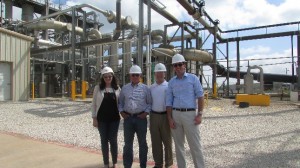 On Tuesday morning, the ASP delegation drove to the McCommas Bluff landfill, operated by the city of Dallas. The city claims to be adding about 6400 tons of waste per day to the landfill.
On Tuesday morning, the ASP delegation drove to the McCommas Bluff landfill, operated by the city of Dallas. The city claims to be adding about 6400 tons of waste per day to the landfill.
That waste is digested by bacteria into a combination of gases that can be harvested for fuel. A bit more than half of the gas that is vented from typical landfills is methane – natural gas: a clean-burning fuel that also is a potent greenhouse gas if emitted directly into the atmosphere.
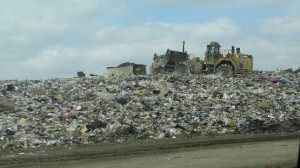 Throughout McCommas Bluff, the company Clean Energy Fuels has sunk over 450 pipes into landfill to harvest that gas before it escapes into the atmosphere. They pipe it from the landfill over to a processing facility that separates the gas into its constituent parts: sulfur dioxide (the source of that characteristic smell), carbon dioxide, nitrogen, trace contaminants, and methane. They process the methane until it is pure enough and concentrated enough to connect to the nearby interstate gas pipeline and send it on its way.
Throughout McCommas Bluff, the company Clean Energy Fuels has sunk over 450 pipes into landfill to harvest that gas before it escapes into the atmosphere. They pipe it from the landfill over to a processing facility that separates the gas into its constituent parts: sulfur dioxide (the source of that characteristic smell), carbon dioxide, nitrogen, trace contaminants, and methane. They process the methane until it is pure enough and concentrated enough to connect to the nearby interstate gas pipeline and send it on its way.
From Dallas, this gas is contracted to supply Sacramento with clean gas for energy. About 70% of the landfill’s harvested gas is used for this purpose, while the rest is used by Clean Energy Fuels as transportation fuel that they sell. In this way, the people of Sacramento are turning on their lights by using gas that is a direct result of the waste of the people of Dallas.
Effects of Drought on Texas
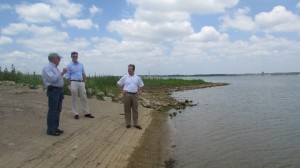 After the tour of McCommas Bluff, the ASP visited Lake Grapevine Lake Reservoir, north of Dallas. The lake was at 62% of capacity when the delegation visited, a direct result of the ongoing Texas drought, one of the four lowest levels since the reservoir was created in the 1950s.
After the tour of McCommas Bluff, the ASP visited Lake Grapevine Lake Reservoir, north of Dallas. The lake was at 62% of capacity when the delegation visited, a direct result of the ongoing Texas drought, one of the four lowest levels since the reservoir was created in the 1950s.
For Dallas, the water shortage has not yet become a crisis. However, other cities further west and north in Texas have struggled to meet the challenge of the drought. For example, Lake Abiline, only 180 miles west of Dallas, is 3.4% full. North of Dallas, along the Red River, the city of Wichita Falls, Texas has effectively run out of water and is actively searching for alternative sources.
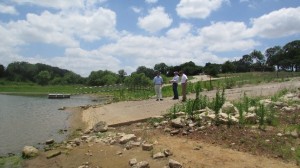 Even in the Dallas area, though, drought is having a real effect. As the ASP delegates saw in their visit, Lake Grapevine was more than 10 feet below its level. This harms the ability of locals to use the lake and will eventually force the residents of the Dallas area to make some difficult choices about their water use. As the drought continues, and as ASP’s Texas and climate change paper makes clear, the problem of drought is likely to be a persistent one for Texas. It is time for the state to make plans for a hotter, drier future.
Even in the Dallas area, though, drought is having a real effect. As the ASP delegates saw in their visit, Lake Grapevine was more than 10 feet below its level. This harms the ability of locals to use the lake and will eventually force the residents of the Dallas area to make some difficult choices about their water use. As the drought continues, and as ASP’s Texas and climate change paper makes clear, the problem of drought is likely to be a persistent one for Texas. It is time for the state to make plans for a hotter, drier future.
ASP’s trip to Dallas highlighted the challenges that the state faces from a changing climate, but it also showed how companies, local governments, and individuals are beginning the process of planning for the inevitable.






[…] ASP in Dallas: Climate Change and America’s National Security […]